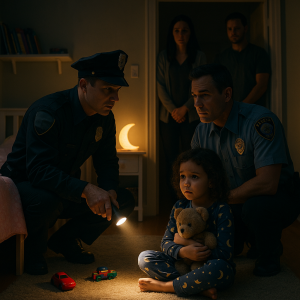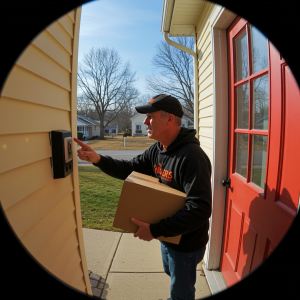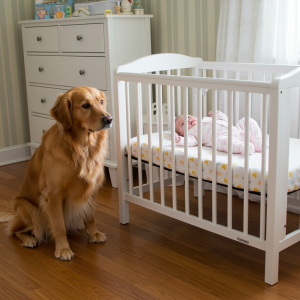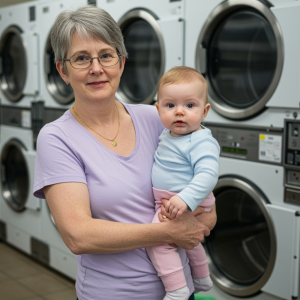The early morning chaos of Chicago’s O’Hare buzzed around me as I navigated through streams of hurried travelers, my rolling suitcase trailing behind while I carefully adjusted the specialized harness supporting my companion. Charlie, my chocolate Labrador mix, peered alertly through the ventilation panels of his travel carrier, those intelligent amber eyes taking in every sight and sound with the focused attention that made him extraordinary.
Charlie represented far more than canine companionship. Following a devastating car crash three years prior that resulted in traumatic brain injury and severe PTSD episodes, this remarkable animal had transformed from a struggling rescue into my essential medical partner. His specialized training enabled him to detect oncoming panic attacks before I recognized the symptoms myself, provide deep pressure therapy during episodes, and assist with mobility when my injuries flared. While strangers saw an affectionate dog with a perpetually optimistic expression, I knew him as the bridge between my former independence and current limitations.
Previous air travel with Charlie had proceeded smoothly—documentation verified, identification clearly displayed, airline personnel cooperative. Occasionally curious passengers would ask friendly questions or offer compliments, but interactions remained pleasant and brief.
That particular Tuesday morning, however, would challenge both my resilience and my faith in human decency in ways I never anticipated.
The Confrontation Begins
Settling into a vacant chair near Gate 23, I felt Charlie immediately position himself against my legs, his warm presence already working to calm my pre-flight anxiety. Despite outward composure, my hands betrayed nervousness as they fidgeted with his service vest straps—flying remained one of my greatest challenges.
A professionally dressed woman, perhaps in her early fifties, claimed the seat directly opposite mine. Her appearance projected corporate authority: steel-gray hair styled in a severe chignon, designer pumps that announced each step, and a bluetooth earpiece conducting what sounded like urgent business negotiations. Her initial glance toward Charlie conveyed unmistakable disgust before she deliberately turned away.
Initially, I dismissed her reaction. Not everyone appreciated dogs, which was perfectly acceptable. However, when her call concluded, she leaned forward with barely concealed hostility.
“Pets belong in cargo carriers, not passenger cabins,” she declared loudly enough to attract attention from nearby travelers.
Charlie’s ears twitched at her sharp tone, his body tensing slightly against mine. I straightened my shoulders. “Charlie is a certified service animal. Federal law permits him to accompany me in the cabin.”
Her expression hardened at my explanation. “Right. Another person gaming the system with fake paperwork. I’ve witnessed this scam countless times—people buying phony vests online to avoid kennel fees and restrictions.”
My face flushed with indignation. “I carry complete medical documentation and trainer certifications if you’d prefer to examine them.”
Rather than respond, she stood abruptly and strode toward the gate counter with determined steps. I watched helplessly as she gestured animatedly in my direction, her complaints becoming increasingly animated though the specific words remained inaudible. The young airline representative appeared increasingly uncomfortable, casting apologetic glances toward me.
Public Scrutiny
Whispered conversations erupted throughout the waiting area. Fellow passengers stared openly—some with sympathy, others with skepticism, many simply curious about the unfolding drama. The familiar tightness began building in my chest, that crushing sensation that preceded my worst episodes. Instinctively, I placed my palm on Charlie’s head, drawing strength from his unwavering calm.
Minutes later, the flustered gate agent approached, the complaining woman following close behind with an expression of premature victory.
“Ma’am,” he began hesitantly, “this passenger has expressed concerns regarding your animal. Would it be possible to review his credentials?”
“Absolutely,” I replied without hesitation, retrieving the comprehensive folder I maintained specifically for such situations. The packet included Charlie’s service animal certification, current health records, and detailed physician documentation explaining my medical necessity.
After careful examination, the agent nodded approvingly. “Everything appears completely legitimate. Your service animal is cleared for cabin travel.”
Relief flooded through me momentarily—until the woman escalated her attack.
“This is absolutely unacceptable,” she snapped. “I suffer from severe respiratory allergies. Forcing me to endure hours in an enclosed space with a shedding animal constitutes a legitimate health emergency.”
The agent wavered visibly, caught between established regulations and an increasingly volatile situation. Before he could formulate a response, she amplified her voice strategically to influence surrounding passengers.
“I paid premium prices for this ticket. I refuse to sit adjacent to any animal. Either it gets relocated to cargo or I demand an immediate seat change.”
The Moment of Truth
By now, every person in the boarding area was watching our confrontation unfold. My cheeks burned with embarrassment as anxiety levels spiked dangerously high—the familiar warning signs of an approaching panic attack. Charlie sensed the change immediately, pressing more firmly against my legs and fixing his gaze on my face with trained intensity. His grounding technique helped me maintain control.
The agent retreated to consult with colleagues, leaving me exposed to continued public scrutiny. The woman settled back into her chair with obvious self-satisfaction, apparently convinced of her impending triumph.
I felt completely alone and vulnerable, until Charlie’s steady breathing reminded me otherwise.
When boarding announcements finally began, the agent returned with noticeably more confidence in his demeanor. “Ma’am,” he addressed the woman directly, “service animals enjoy federal protection under the Americans with Disabilities Act. This animal is legally permitted aboard. However, given your stated allergies, I can certainly relocate you to a different section of the aircraft, well away from this passenger and her service dog.”
The woman’s smugness evaporated instantly. “I shouldn’t be the one facing inconvenience!” she exploded. “That animal has no business—”
An Unexpected Champion
“Pardon the interruption.”
A distinguished gentleman in his late sixties rose from across the waiting area, his presence commanding immediate attention. His appearance suggested medical profession—crisp white coat visible beneath an expensive overcoat, confident bearing, and intelligent eyes behind wire-rimmed glasses.
“I’m Dr. Stevens, emergency medicine,” he announced clearly. “As someone with extensive experience treating both allergic reactions and working with service animals in medical settings, I can definitively state that the airline is handling this situation appropriately. A properly trained service dog poses zero health risks to allergic passengers when seated several rows apart. However, separating this young woman from her medical support animal would genuinely compromise her wellbeing and safety. Unless you’re prepared to assume liability for any resulting medical emergency, I strongly suggest you cease this harassment immediately.”
Murmurs of agreement rippled through the crowd, passengers nodding approval at his intervention.
The woman’s face transformed from pale to crimson in seconds. She opened her mouth several times without producing sound, then snapped it shut and stormed toward the boarding queue without another word.
My knees nearly buckled with gratitude. Dr. Stevens offered an encouraging nod before returning to gather his luggage.
Victory and Validation
During the flight, Charlie tucked himself perfectly beneath the seat ahead, remaining completely still and silent throughout the journey. Several passengers made efforts to compliment his exemplary behavior, their genuine warmth helping heal the earlier wounds. One flight attendant even stopped to acknowledge what a “perfect gentleman” he was.
Midway through our flight, unexpected turbulence triggered familiar symptoms—constricted breathing, cold sweats, the creeping panic that threatened to overwhelm me. Before conscious recognition set in, Charlie was already responding, nudging my hand insistently and positioning his body to provide deep pressure therapy. I concentrated on synchronizing my breathing with his until the episode subsided completely.
Glancing up, I noticed Dr. Stevens observing from several rows ahead. When our eyes met, he offered a subtle, understanding smile before turning back to his reading.
Charlie rested his muzzle across my feet, tail creating gentle thumping sounds against the floor—his way of confirming that everything was under control.
Lessons Learned
As we prepared for landing, passengers collected belongings and prepared to deplane. The confrontational woman rushed past without acknowledgment, but others paused to offer supportive comments. One elderly gentleman even said, “That dog of yours is absolutely remarkable.”
And he was absolutely correct.
Stepping off that aircraft with Charlie beside me, I realized the morning’s confrontation hadn’t concluded as our antagonist intended. She had attempted to shame me, to strip away my legal rights and dignity—but instead, truth had prevailed with support from strangers who refused to tolerate discrimination.
The experience didn’t just surprise everyone present—it reminded me of something my anxiety often obscured: genuine kindness still flourished in unexpected places.
Charlie trotted confidently beside me through the terminal, tail wagging enthusiastically, ears alert as though he too understood we’d achieved something significant that day. And for the first time in months, I felt capable of breathing freely again, knowing that when adversity strikes, allies can emerge from the most unlikely circumstances.





